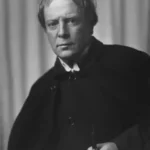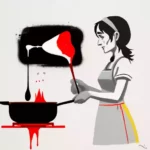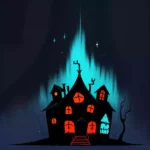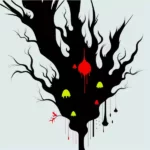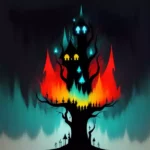 | |
The Inmost Light | |
| Author | Arthur Machen |
|---|---|
| Published |
1922
|
| Language | English |
| Nationality | British |
| Genre | Horror, Supernatural Fiction |
1922 Short Story
The Inmost Light
The Inmost Light is an English Horror, Supernatural Fiction short story by British writer Arthur Machen. It was first published in 1922. The Inmost Light is a masterful story revealing the confessions of a scientist of the occult-- pieced together clues by two busy-body acquaintances, who turn nothing into something...terrifying. Published in 1922, as one of four stories in Machen's The House of Souls and anthologized in Masterpieces of Mystery: Mystic-Humorous Stories (1920), edited by Joseph Lewis French.
The Inmost Light
by Arthur Machen
I
ONE evening in autumn, when the deformities of London were veiled in faint blue mist, and its vistas and far-reaching streets seemed splendid, Mr. Charles Salisbury was slowly pacing down Rupert Street, drawing nearer to his favourite restaurant by slow degrees. His eyes were downcast in study of the pavement, and thus it was that as he passed in at the narrow door a man who had come up from the lower end of the street jostled against him.
‘I beg your pardonwasn’t looking where I was going. Why, it’s Dyson!’
‘Yes, quite so. How are you, Salisbury?’
‘Quite well. But where have you been, Dyson? I don’t think I can have seen you for the last five years?’
‘No; I dare say not. You remember I was getting rather hard up when you came to my place at Charlotte Street?’
‘Perfectly. I think I remember your telling me that you owed five weeks’ rent, and that you had parted with your watch for a comparatively small sum.’
‘My dear Salisbury, your memory is admirable. Yes, I was hard up. But the curious thing is that soon after you saw me I became harder up. My financial state was described by a friend as “stone broke.” I don’t approve of slang, mind you, but such was my condition. But suppose we go in; there might be other people who would like to dineit’s a human weakness, Salisbury.’
‘Certainly; come along. I was wondering as I walked down whether the corner table were taken. It has a velvet back, you know.’
‘I know the spot; it’s vacant. Yes, as I was saying, I became even harder up.’
‘What did you do then?’ asked Salisbury, disposing of his hat, and settling down in the corner of the seat, with a glance of fond anticipation at the menu.
‘What did I do? Why, I sat down and reflected. I had a good classical education, and a positive distaste for business of any kind: that was the capital with which I faced the world. Do you know, I have heard people describe olives as nasty! What lamentable Philistinism! I have often thought, Salisbury, that I could write genuine poetry under the influence of olives and red wine. Let us have Chianti; it may not be very good, but the flasks are simply charming.’
‘It is pretty good here. We may as well have a big flask.’
‘Very good. I reflected, then, on my want of prospects, and I determined to embark in literature.’
‘Really; that was strange. You seem in pretty comfortable circumstances, though.’
‘Though! What a satire upon a noble profession. I am afraid, Salisbury, you haven’t a proper idea of the dignity of an artist. You see me sitting at my deskor at least you can see me if you care to callwith pen and ink, and simple nothingness before me, and if you come again in a few hours you will (in all probability) find a creation!’
‘Yes, quite so. I had an idea that literature was not remunerative.’
‘You are mistaken; its rewards are great. I may mention, by the way, that shortly after you saw me I succeeded to a small income. An uncle died, and proved unexpectedly generous.’
‘Ah, I see. That must have been convenient.’
‘It was pleasantundeniably pleasant. I have always considered it in the light of an endowment of my researches. I told you I was a man of letters; it would, perhaps, be more correct to describe myself as a man of science.’
‘Dear me, Dyson, you have really changed very much in the last few years. I had a notion, don’t you know, that you were a sort of idler about town, the kind of man one might meet on the north side of Piccadilly every day from May to July.’
‘Exactly. I was even then forming myself, though all unconsciously. You know my poor father could not afford to send me to the University. I used to grumble in my ignorance at not having completed my education. That was the folly of youth, Salisbury; my University was Piccadilly. There I began to study the great science which still occupies me.’
‘What science do you mean?’
‘The science of the great city; the physiology of London; literally and metaphysically the greatest subject that the mind of man can conceive. What an admirable salmi this is; undoubtedly the final end of the pheasant. Yet I feel sometimes positively overwhelmed with the thought of the vastness and complexity of London. Paris a man may get to understand thoroughly with a reasonable amount of study; but London is always a mystery. In Paris you may say: “Here live the actresses, here the Bohemians, and the Ratés”; but it is different in London. You may point out a street, correctly enough, as the abode of washerwomen; but, in that second floor, a man may be studying Chaldee roots, and in the garret over the way a forgotten artist is dying by inches.’
‘I see you are Dyson, unchanged and unchangeable,’ said Salisbury, slowly sipping his Chianti. ‘I think you are misled by a too fervid imagination; the mystery of London exists only in your fancy. It seems to me a dull place enough. We seldom hear of a really artistic crime in London, whereas I believe Paris abounds in that sort of thing.’
‘Give me some more wine. Thanks. You are mistaken, my dear fellow, you are really mistaken. London has nothing to be ashamed of in the way of crime. Where we fail is for want of Homers, not Agamemnons. Carent quia vate sacro, you know.’
‘I recall the quotation. But I don’t think I quite follow you.’
‘Well, in plain language, we have no good writers in London who make a speciality of that kind of thing. Our common reporter is a dull dog; every story that he has to tell is spoilt in the telling. His idea of horror and of what excites horror is so lamentably deficient. Nothing will content the fellow but blood, vulgar red blood, and when he can get it he lays it on thick, and considers that he has produced a telling article. It’s a poor notion. And, by some curious fatality, it is the most commonplace and brutal murders which always attract the most attention and get written up the most. For instance, I dare say that you never heard of the Harlesden case?’
‘No; no, I don’t remember anything about it.’
‘Of course not. And yet the story is a curious one. I will tell it you over our coffee. Harlesden, you know, or I expect you don’t know, is quite on the out-quarters of London; something curiously different from your fine old crusted suburb like Norwood or Hampstead, different as each of these is from the other. Hampstead, I mean, is where you look for the head of your great China house with his three acres of land and pine-houses, though of late there is the artistic substratum; while Norwood is the home of the prosperous middle-class family who took the house “because it was near the Palace,” and sickened of the Palace six months afterwards; but Harlesden is a place of no character. It’s too new to have any character as yet. There are the rows of red houses and the rows of white houses and the bright green Venetians, and the blistering doorways, and the little backyards they call gardens, and a few feeble shops, and then, just as you think you’re going to grasp the physiognomy of the settlement, it all melts away.’
‘How the dickens is that? the houses don’t tumble down before one’s eyes, I suppose!’
‘Well, no, not exactly that. But Harlesden as an entity disappears. Your street turns into a quiet lane, and your staring houses into elm trees, and the back-gardens into green meadows. You pass instantly from town to country; there is no transition as in a small country town, no soft gradations of wider lawns and orchards, with houses gradually becoming less dense, but a dead stop. I believe the people who live there mostly go into the City. I have seen once or twice a laden ‘bus bound thitherwards. But however that may be, I can’t conceive a greater loneliness in a desert at midnight than there is there at midday. It is like a city of the dead; the streets are glaring and desolate, and as you pass it suddenly strikes you that this too is part of London. Well, a year or two ago there was a doctor living there; he had set up his brass plate and his red lamp at the very end of one of those shining streets, and from the back of the house, the fields stretched away to the north. I don’t know what his reason was in settling down in such an out-of-the-way place, perhaps Dr. Black, as we will call him, was a far-seeing man and looked ahead. His relations, so it appeared afterwards, had lost sight of him for many years and didn’t even know he was a doctor, much less where he lived. However, there he was settled in Harlesden, with some fragments of a practice, and an uncommonly pretty wife. People used to see them walking out together in the summer evenings soon after they came to Harlesden, and, so far as could be observed, they seemed a very affectionate couple. These walks went on through the autumn, and then ceased; but, of course, as the days grew dark and the weather cold, the lanes near Harlesden might be expected to lose many of their attractions. All through the winter nobody saw anything of Mrs. Black; the doctor used to reply to his patients’ inquiries that she was a “little out of sorts, would be better, no doubt, in the spring.” But the spring came, and the summer, and no Mrs. Black appeared, and at last people began to rumour and talk amongst themselves, and all sorts of queer things were said at “high teas,” which you may possibly have heard are the only form of entertainment known in such suburbs. Dr. Black began to surprise some very odd looks cast in his direction, and the practice, such as it was, fell off before his eyes. In short, when the neighbours whispered about the matter, they whispered that Mrs. Black was dead, and that the doctor had made away with her. But this wasn’t the case; Mrs. Black was seen alive in June. It was a Sunday afternoon, one of those few exquisite days that an English climate offers, and half London had strayed out into the fields, north, south, east, and west to smell the scent of the white May, and to see if the wild roses were yet in blossom in the hedges. I had gone out myself early in the morning, and had had a long ramble, and somehow or other as I was steering homeward I found myself in this very Harlesden we have been talking about. To be exact, I had a glass of beer in the “General Gordon,” the most flourishing house in the neighbourhood, and as I was wandering rather aimlessly about, I saw an uncommonly tempting gap in a hedgerow, and resolved to explore the meadow beyond. Soft grass is very grateful to the feet after the infernal grit strewn on suburban sidewalks, and after walking about for some time I thought I should like to sit down on a bank and have a smoke. While I was getting out my pouch, I looked up in the direction of the houses, and as I looked I felt my breath caught back, and my teeth began to chatter, and the stick I had in one hand snapped in two with the grip I gave it. It was as if I had had an electric current down my spine, and yet for some moment of time which seemed long, but which must have been very short, I caught myself wondering what on earth was the matter. Then I knew what had made my very heart shudder and my bones grind together in an agony. As I glanced up I had looked straight towards the last house in the row before me, and in an upper window of that house I had seen for some short fraction of a second a face. It was the face of a woman, and yet it was not human. You and I, Salisbury, have heard in our time, as we sat in our seats in church in sober English fashion, of a lust that cannot be satiated and of a fire that is unquenchable, but few of us have any notion what these words mean. I hope you never may, for as I saw that face at the window, with the blue sky above me and the warm air playing in gusts about me, I knew I had looked into another worldlooked through the window of a commonplace, brand-new house, and seen hell open before me. When the first shock was over, I thought once or twice that I should have fainted; my face streamed with a cold sweat, and my breath came and went in sobs, as if I had been half drowned. I managed to get up at last, and walked round to the street, and there I saw the name “Dr. Black” on the post by the front gate. As fate or my luck would have it, the door opened and a man came down the steps as I passed by. I had no doubt it was the doctor himself. He was of a type rather common in London; long and thin, with a pasty face and a dull black moustache. He gave me a look as we passed each other on the pavement, and though it was merely the casual glance which one foot-passenger bestows on another, I felt convinced in my mind that here was an ugly customer to deal with. As you may imagine, I went my way a good deal puzzled and horrified too by what I had seen; for I had paid another visit to the “General Gordon,” and had got together a good deal of the common gossip of the place about the Blacks. I didn’t mention the fact that I had seen a woman’s face in the window; but I heard that Mrs. Black had been much admired for her beautiful golden hair, and round what had struck me with such a nameless terror, there was a mist of flowing yellow hair, as it were an aureole of glory round the visage of a satyr. The whole thing bothered me in an indescribable manner; and when I got home I tried my best to think of the impression I had received as an illusion, but it was no use. I knew very well I had seen what I have tried to describe to you, and I was morally certain that I had seen Mrs. Black. And then there was the gossip of the place, the suspicion of foul play, which I knew to be false, and my own conviction that there was some deadly mischief or other going on in that bright red house at the corner of Devon Road: how to construct a theory of a reasonable kind out of these two elements. In short, I found myself in a world of mystery; I puzzled my head over it and filled up my leisure moments by gathering together odd threads of speculation, but I never moved a step towards any real solution, and as the summer days went on the matter seemed to grow misty and indistinct, shadowing some vague terror, like a nightmare of last month. I suppose it would before long have faded into the background of my brainI should not have forgotten it, for such a thing could never be forgottenbut one morning as I was looking over the paper my eye was caught by a heading over some two dozen lines of small type. The words I had seen were simply, “The Harlesden Case,” and I knew what I was going to read. Mrs. Black was dead. Black had called in another medical man to certify as to cause of death, and something or other had aroused the strange doctor’s suspicions and there had been an inquest and post-mortem. And the result? That, I will confess, did astonish me considerably; it was the triumph of the unexpected. The two doctors who made the autopsy were obliged to confess that they could not discover the faintest trace of any kind of foul play; their most exquisite tests and reagents failed to detect the presence of poison in the most infinitesimal quantity. Death, they found, had been caused by a somewhat obscure and scientifically interesting form of brain disease. The tissue of the brain and the molecules of the grey matter had undergone a most extraordinary series of changes; and the younger of the two doctors, who has some reputation, I believe, as a specialist in brain trouble, made some remarks in giving his evidence which struck me deeply at the time, though I did not then grasp their full significance. He said: “At the commencement of the examination I was astonished to find appearances of a character entirely new to me, notwithstanding my somewhat large experience. I need not specify these appearances at present, it will be sufficient for me to state that as I proceeded in my task I could scarcely believe that the brain before me was that of a human being at all.” There was some surprise at this statement, as you may imagine, and the coroner asked the doctor if he meant to say that the brain resembled that of an animal. “No,” he replied, “I should not put it in that way. Some of the appearances I noticed seemed to point in that direction, but others, and these were the more surprising, indicated a nervous organization of a wholly different character from that either of man or the lower animals.” It was a curious thing to say, but of course the jury brought in a verdict of death from natural causes, and, so far as the public was concerned, the case came to an end. But after I had read what the doctor said I made up my mind that I should like to know a good deal more, and I set to work on what seemed likely to prove an interesting investigation. I had really a good deal of trouble, but I was successful in a measure. Though whymy dear fellow, I had no notion at the time. Are you aware that we have been here nearly four hours? The waiters are staring at us. Let’s have the bill and be gone.’
The two men went out in silence, and stood a moment in the cool air, watching the hurrying traffic of Coventry Street pass before them to the accompaniment of the ringing bells of hansoms and the cries of the newsboys; the deep far murmur of London surging up ever and again from beneath these louder noises.
‘It is a strange case, isn’t it?’ said Dyson at length. ‘What do you think of it?’
‘My dear fellow, I haven’t heard the end, so I will reserve my opinion. When will you give me the sequel?’
‘Come to my rooms some evening; say next Thursday. Here’s the address. Good-night; I want to get down to the Strand.’ Dyson hailed a passing hansom, and Salisbury turned northward to walk home to his lodgings.
II
Mr. Salisbury, as may have been gathered from the few remarks which he had found it possible to introduce in the course of the evening, was a young gentleman of a peculiarly solid form of intellect, coy and retiring before the mysterious and the uncommon, with a constitutional dislike of paradox. During the restaurant dinner he had been forced to listen in almost absolute silence to a strange tissue of improbabilities strung together with the ingenuity of a born meddler in plots and mysteries, and it was with a feeling of weariness that he crossed Shaftesbury Avenue, and dived into the recesses of Soho, for his lodgings were in a modest neighbourhood to the north of Oxford Street. As he walked he speculated on the probable fate of Dyson, relying on literature, unbefriended by a thoughtful relative, and could not help concluding that so much subtlety united to a too vivid imagination would in all likelihood have been rewarded with a pair of sandwich-boards or a super’s banner. Absorbed in this train of thought, and admiring the perverse dexterity which could transmute the face of a sickly woman and a case of brain disease into the crude elements of romance, Salisbury strayed on through the dimly-lighted streets, not noticing the gusty wind which drove sharply round corners and whirled the stray rubbish of the pavement into the air in eddies, while black clouds gathered over the sickly yellow moon. Even a stray drop or two of rain blown into his face did not rouse him from his meditations, and it was only when with a sudden rush the storm tore down upon the street that he began to consider the expediency of finding some shelter. The rain, driven by the wind, pelted down with the violence of a thunderstorm, dashing up from the stones and hissing through the air, and soon a perfect torrent of water coursed along the kennels and accumulated in pools over the choked-up drains. The few stray passengers who had been loafing rather than walking about the street had scuttered away, like frightened rabbits, to some invisible places of refuge, and though Salisbury whistled loud and long for a hansom, no hansom appeared. He looked about him, as if to discover how far he might be from the haven of Oxford Street, but strolling carelessly along, he had turned out of his way, and found himself in an unknown region, and one to all appearance devoid even of a public-house where shelter could be bought for the modest sum of twopence. The street lamps were few and at long intervals, and burned behind grimy glasses with the sickly light of oil, and by this wavering glimmer Salisbury could make out the shadowy and vast old houses of which the street was composed. As he passed along, hurrying, and shrinking from the full sweep of the rain, he noticed the innumerable bell-handles, with names that seemed about to vanish of old age graven on brass plates beneath them, and here and there a richly carved penthouse overhung the door, blackening with the grime of fifty years. The storm seemed to grow more and more furious; he was wet through, and a new hat had become a ruin, and still Oxford Street seemed as far off as ever; it was with deep relief that the dripping man caught sight of a dark archway which seemed to promise shelter from the rain if not from the wind. Salisbury took up his position in the driest corner and looked about him; he was standing in a kind of passage contrived under part of a house, and behind him stretched a narrow footway leading between blank walls to regions unknown. He had stood there for some time, vainly endeavouring to rid himself of some of his superfluous moisture, and listening for the passing wheel of a hansom, when his attention was aroused by a loud noise coming from the direction of the passage behind, and growing louder as it drew nearer. In a couple of minutes he could make out the shrill, raucous voice of a woman, threatening and renouncing, and making the very stones echo with her accents, while now and then a man grumbled and expostulated. Though to all appearance devoid of romance, Salisbury had some relish for street rows, and was, indeed, somewhat of an amateur in the more amusing phases of drunkenness; he therefore composed himself to listen and observe with something of the air of a subscriber to grand opera. To his annoyance, however, the tempest seemed suddenly to be composed, and he could hear nothing but the impatient steps of the woman and the slow lurch of the man as they came towards him. Keeping back in the shadow of the wall, he could see the two drawing nearer; the man was evidently drunk, and had much ado to avoid frequent collision with the wall as he tacked across from one side to the other, like some bark beating up against a wind. The woman was looking straight in front of her, with tears streaming from her eyes, but suddenly as they went by the flame blazed up again, and she burst forth into a torrent of abuse, facing round upon her companion.
‘You low rascal, you mean, contemptible cur,’ she went on, after an incoherent storm of curses, ‘you think I’m to work and slave for you always, I suppose, while you’re after that Green Street girl and drinking every penny you’ve got? But you’re mistaken, Samindeed, I’ll bear it no longer. Damn you, you dirty thief, I’ve done with you and your master too, so you can go your own errands, and I only hope they’ll get you into trouble.’
The woman tore at the bosom of her dress, and taking something out that looked like paper, crumpled it up and flung it away. It fell at Salisbury’s feet. She ran out and disappeared in the darkness, while the man lurched slowly into the street, grumbling indistinctly to himself in a perplexed tone of voice. Salisbury looked out after him and saw him maundering along the pavement, halting now and then and swaying indecisively, and then starting off at some fresh tangent. The sky had cleared, and white fleecy clouds were fleeting across the moon, high in the heaven. The light came and went by turns, as the clouds passed by, and, turning round as the clear, white rays shone into the passage, Salisbury saw the little ball of crumpled paper which the woman had cast down. Oddly curious to know what it might contain, he picked it up and put it in his pocket, and set out afresh on his journey.
III
Salisbury was a man of habit. When he got home, drenched to the skin, his clothes hanging lank about him, and a ghastly dew besmearing his hat, his only thought was of his health, of which he took studious care. So, after changing his clothes and encasing himself in a warm dressing-gown, he proceeded to prepare a sudorific in the shape of a hot gin and water, warming the latter over one of those spirit-lamps which mitigate the austerities of the modern hermit’s life. By the time this preparation had been exhibited, and Salisbury’s disturbed feelings had been soothed by a pipe of tobacco, he was able to get into bed in a happy state of vacancy, without a thought of his adventure in the dark archway, or of the weird fancies with which Dyson had seasoned his dinner. It was the same at breakfast the next morning, for Salisbury made a point of not thinking of any thing until that meal was over; but when the cup and saucer were cleared away, and the morning pipe was lit, he remembered the little ball of paper, and began fumbling in the pockets of his wet coat. He did not remember into which pocket he had put it, and as he dived now into one and now into another, he experienced a strange feeling of apprehension lest it should not be there at all, though he could not for the life of him have explained the importance he attached to what was in all probability mere rubbish. But he sighed with relief when his fingers touched the crumpled surface in an inside pocket, and he drew it out gently and laid it on the little desk by his easy-chair with as much care as if it had been some rare jewel. Salisbury sat smoking and staring at his find for a few minutes, an odd temptation to throw the thing in the fire and have done with it struggling with as odd a speculation as to its possible contents, and as to the reason why the infuriated woman should have flung a bit of paper from her with such vehemence. As might be expected, it was the latter feeling that conquered in the end, and yet it was with something like repugnance that he at last took the paper and unrolled it, and laid it out before him. It was a piece of common dirty paper, to all appearance torn out of a cheap exercise-book, and in the middle were a few lines written in a queer cramped hand. Salisbury bent his head and stared eagerly at it for a moment, drawing a long breath, and then fell back in his chair gazing blankly before him, till at last with a sudden revulsion he burst into a peal of laughter, so long and loud and uproarious that the landlady’s baby on the floor below awoke from sleep and echoed his mirth with hideous yells. But he laughed again and again, and took the paper up to read a second time what seemed such meaningless nonsense.
‘Q. has had to go and see his friends in Paris,’ it began. ‘Traverse Handle S. “Once around the grass, and twice around the lass, and thrice around the maple tree.”‘
Salisbury took up the paper and crumpled it as the angry woman had done, and aimed it at the fire. He did not throw it there, however, but tossed it carelessly into the well of the desk, and laughed again. The sheer folly of the thing offended him, and he was ashamed of his own eager speculation, as one who pores over the high-sounding announcements in the agony column of the daily paper, and finds nothing but advertisement and triviality. He walked to the window, and stared out at the languid morning life of his quarter; the maids in slatternly print dresses washing door-steps, the fish-monger and the butcher on their rounds, and the tradesmen standing at the doors of their small shops, drooping for lack of trade and excitement. In the distance a blue haze gave some grandeur to the prospect, but the view as a whole was depressing, and would only have interested a student of the life of London, who finds something rare and choice in its very aspect. Salisbury turned away in disgust, and settled himself in the easy-chair, upholstered in a bright shade of green, and decked with yellow gimp, which was the pride and attraction of the apartments. Here he composed himself to his morning’s occupationthe perusal of a novel that dealt with sport and love in a manner that suggested the collaboration of a stud-groom and a ladies’ college. In an ordinary way, however, Salisbury would have been carried on by the interest of the story up to lunch-time, but this morning he fidgeted in and out of his chair, took the book up and laid it down again, and swore at last to himself and at himself in mere irritation. In point of fact the jingle of the paper found in the archway had ‘got into his head,’ and do what he would he could not help muttering over and over, ‘Once around the grass, and twice around the lass, and thrice around the maple tree.’ It became a positive pain, like the foolish burden of a music-hall song, everlastingly quoted, and sung at all hours of the day and night, and treasured by the street-boys as an unfailing resource for six months together. He went out into the streets, and tried to forget his enemy in the jostling of the crowds and the roar and clatter of the traffic, but presently he would find himself stealing quietly aside, and pacing some deserted byway, vainly puzzling his brains, and trying to fix some meaning to phrases that were meaningless. It was a positive relief when Thursday came, and he remembered that he had made an appointment to go and see Dyson; the flimsy reveries of the self-styled man of letters appeared entertaining when compared with this ceaseless iteration, this maze of thought from which there seemed no possibility of escape. Dyson’s abode was in one of the quietest of the quiet streets that led down from the Strand to the river, and when Salisbury passed from the narrow stairway into his friend’s room, he saw that the uncle had been beneficent indeed. The floor glowed and flamed with all the colours of the East; it was, as Dyson pompously remarked, ‘a sunset in a dream,’ and the lamplight, the twilight of London streets, was shut out with strangely worked curtains, glittering here and there with threads of gold. In the shelves of an oak armoire stood jars and plates of old French china, and the black and white of etchings not to be found in the Haymarket or in Bond Street, stood out against the splendour of a Japanese paper. Salisbury sat down on the settle by the hearth, and sniffed the mingled fumes of incense and tobacco, wondering and dumb before all this splendour after the green rep and the oleographs, the gilt-framed mirror, and the lustres of his own apartment.
‘I am glad you have come,’ said Dyson. ‘Comfortable little room, isn’t it? But you don’t look very well, Salisbury. Nothing disagreed with you, has it?’
‘No; but I have been a good deal bothered for the last few days. The fact is I had an odd kind ofofadventure, I suppose I may call it, that night I saw you, and it has worried me a good deal. And the provoking part of it is that it’s the merest nonsensebut, however, I will tell you all about it, by and by. You were going to let me have the rest of that odd story you began at the restaurant.’
‘Yes. But I am afraid, Salisbury, you are incorrigible. You are a slave to what you call matter of fact. You know perfectly well that in your heart you think the oddness in that case is of my making, and that it is all really as plain as the police reports. However, as I have begun, I will go on. But first we will have something to drink, and you may as well light your pipe.’
Dyson went up to the oak cupboard, and drew from its depths a rotund bottle and two little glasses, quaintly gilded.
‘It’s Benedictine,’ he said. ‘You’ll have some, won’t you?’
Salisbury assented, and the two men sat sipping and smoking reflectively for some minutes before Dyson began.
‘Let me see,’ he said at last, ‘we were at the inquest, weren’t we? No, we had done with that. Ah, I remember. I was telling you that on the whole I had been successful in my inquiries, investigation, or whatever you like to call it, into the matter. Wasn’t that where I left off?’
‘Yes, that was it. To be precise, I think “though” was the last word you said on the matter.’
‘Exactly. I have been thinking it all over since the other night, and I have come to the conclusion that that “though” is a very big “though” indeed. Not to put too fine a point on it, I have had to confess that what I found out, or thought I found out, amounts in reality to nothing. I am as far away from the heart of the case as ever.

